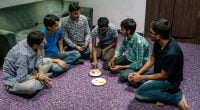I came to Nigeria with just a piece of luggage –Turkish International Colleges foundation coordinator

Date posted: October 1, 2016
Jide Babalola and Seun Akioye
For many Nigerians, it is hard to see the opportunities that abound in the country. Not so for some foreigners who thrive in spite of cultural, social and language challenges. JIDE BABALOLA and SEUN AKIOYE spoke to Behlul Fatih Basaran, coordinator of the Nigerian Turkish International Colleges’ Foundation, who shared his inspirational story.
When Behlul Basaran arrived Nigeria in 2000 from Turkey, he was armed with a single piece of luggage, an enthusiastic spirit and hope. Inside his luggage was his letter of scholarship for a university education from the Hizmet Movement, which had started building a relationship and foundation for quality education with Nigeria. It was a lone chance into a life of relevance, his only ticket to change his life.
But there are hurdles stacked against him; the most glaring being his complete lack of knowledge of the English language, a mode of communication if he was to study in Nigeria. “It was here I first learnt to speak the English language,” Basaran said.
It was a humbling experience for him. He had to begin to learn the new language from the alphabet and work his way up to learn enough for a place in the university. “I started from the elementary level because I did not understand the alphabet back then,” he said.
After years of perfecting his language, he was offered admission into Bayero University Kano (BUK) where he studied at first Physical Education before graduating with a Bachelors of Art in English (Education).
Today Basaran does not look like the man who couldn’t speak English in 2000. He has found fulfilment and joy in one of the most challenging countries in Africa. Now married with children, he has dedicated his life into giving back to the country that helped him find purpose.
Basaran’s life is involved in running the highly influential Nigerian Turkish International Colleges Foundation (NTICF), which was incorporated in 2013 and focuses on various charity activities, including education, health, water, support and renovation of orphanages, among others.
A life of charity
The light began to shine in Basaran’s face when he began to talk about charity and helping those in need. His life passion has found a perfect fitting in the ideology and mission of the NTIC Foundation. “I count myself very lucky because the NTIC Foundation offered me a job that fulfils my personal passion for altruistic or humanitarian efforts. Nothing can be more fulfilling than seeing people happy.
“The job I am paid to do at NTIC Foundation by coordinating charity and humanitarian activities perfectly fits my character and the meaning that I find in life,” he said.
“As an ex-student of BUK, it is always good to go back there and do a few things, including distribution of relief packages to the needy,” he said.
The NTICF, since its inauguration, has been engaged in one of the largest humanitarian works across Nigeria. Indeed one of its cardinal visions is “to relieve the challenges in the areas of education, poverty, psychological and physical disadvantages with all modern instruments and most effective methods while creating a communal awareness of such through campaigns.” In the midst of these laudable objectives, Basaran has also found a way to fulfil his calling.
The NTICF however does not do charity like most of the international donor agencies are wont to do. The foundation ensures all donations are used directly for the beneficiaries without taking off an excessive administrative and logistics costs.
“In the process of undertaking charitable works or philanthropy, most organisations inevitably spend a lot of their resources on logistics and administration but we were able to avoid this. This is done largely through the use of volunteers from NTIC Colleges, mostly school principals and teachers who act as representatives of NTIC Foundation and travel to various states or Internally Displaced Persons (IDPs) camps and distribute goodies to people who need them,” Basaran told The Nation.
Even though there are no regulated timeframe for charity works, the foundation also recognises special festival periods like Sallah and Christmas to extend its hand of fellowship to the needy. During the last Muslim festival, the NTICF reached out to at least 20,000 families across Nigeria.
The targets of this philanthropy are the “genuinely needy people in the society.” These are not difficult to find if one would care to look deeply.
Basaran said: “What we have done here is that we slaughtered seventy cows and ten rams to the needy, majority of whom are in the villages and (IDP) camps. For instance, in Karamajiji village, which hosts the burial ground for Nigeria’s war heroes, soldiers who made the supreme sacrifice in the service of their fatherland, we made sure that virtually everyone of some 512 families there received NTIC Foundation’s charity and humanitarian packages.”
The model for giving during festival periods is highlighted in the Lagos model. About 70 cows were slaughtered, packaged in about 200-250 kilogrammes each in almost 4,500 packages and distributed. This was also done in Abuja, Kaduna, Yobe, Borno, Katsina, Kwara, Sokoto, Niger, Sokoto, Zamfara and Nasarawa states.
But the NTICF didn’t give to the Muslims alone. During the Christmas celebration, the NTICF collaborates with the UFUK Dialogue and other Pentecostal churches to extend charity. We don’t discriminate on religious basis because human needs are similar and we work with both Muslims and Christians as the challenges are similar and we believe that genuine charity or philanthropy must involve reaching out to all of humanity with open arms,” Basaran revealed.
It is the 18th year of giving for the NTICF and there is hope in the horizon. This year, the foundation will focus on education with rehabilitation of school. This year, the goal is to give as much as it can for those who truly needed it.
Already, the foundation has donated classrooms in Kaduna while its partners all over the world will be renovating hundreds of schools. One of the innovative ways of giving is to give out books to underprivileged students. Basaran explains: “Every year, children in NTIC schools leave books behind after completing their session while many return to school to give back books they longer need. We gather these books and distribute them to government schools in rural areas so that it can help them feel inspired or more interested in schooling.
At the moment, we have about twenty to thirty cartons of books in Abuja and other branches across the nation equally have significant numbers of books that are meant for onward distribution. We are also trying to gather and distribute items like good furniture such as tables and chairs, which are no longer being used. Rural government schools make good use of such. At the NTIC Foundation, we try not to waste things.”
NTIC Foundation is a child of the Gullen or Hizmet Movement’s three pillars of work focussed on quality education, charity/humanitarian activities and dialogue (with people of other religious persuasions). The movement’s strong focus on intellectual enrichment, the powerful appeal of its humanitarian efforts to many and the consistent interaction with various Christian, Islamic and other groups, contrary to the expectation of hardliners in Turkey, activities that draw applause in foreign lands have become hampered on their home soil.
In Nigeria, the foundation has also built 200 boreholes between 2014 and 2016; done more than three hundred eye cataract operations in collaboration with Nizamiye Hospital. In Kano, 50 cataract surgeries were carried out for those who cannot afford to come to Abuja for the operation.
Back home in Turkey, a mere donation or volunteer service to any Gulen-affiliated humanitarian organizations or secular schools in Africa now routinely earn many a visit from security agencies.
Running the NTICF is not a walk in the park but for Basaran, it has always been a way of life – a fulfilling passion that make the work and life in Nigeria a pleasant commitment. And he is well paid for his job, in the joy of seeing a need met and satisfaction of serving humanity. “What on earth can compare with the joy of seeing the needy smile so genuinely after overcoming grave challenges? It is great to be here,” he said.
Source: The Nation , October 1 2016
Tags: Africa | Dialogue | Education | Hizmet (Gulen) movement | Humanitarian aid | Nigeria |
























